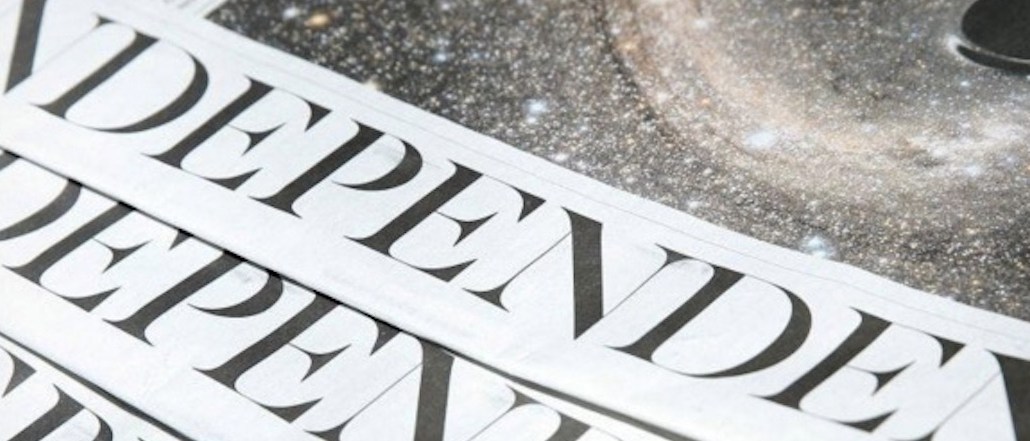Secure your place at the Digiday Media Buying Summit in Nashville, March 2-4

The Independent is going digital-only. Parent company ESI Media confirmed Feb. 12 that The Independent and The Independent on Sunday will publish their last print editions at the end of March and that it sold its spin-off, quick-read newspaper, the i, to Johnston Press. Here’s what to expect when the paper goes online-only, and its prospects.
New hires
Savings from the print titles will go into 25 new digital content jobs. Most will be London-based, with other new hires in the U.S., Beirut and other EMEA markets. Zach Leonard, managing director of digital for ESI Media, which owns the Independent and sister title The Evening Standard, said he expected the digital editorial staff count to double within a year.
Ad blocking
First up, the site plans to test anti-ad-blocking initiatives, with messages telling people they will have to disable their ad blockers if they want to access the site. Leonard said the percentage of the Independent’s monthly visitors of 17 million uniques (comScore) using ad blockers is “way below” the U.K. average of 20 percent, but the publisher still wants to nip the issue in the bud.
Diversifying revenue
Most of the Independent’s revenue comes from advertising, supplemented by syndication licensing deals. The publisher already runs numerous native ad partnerships, but is now creating a team specifically dedicated to creating commercial content on behalf of advertisers – its own in-house content studio, according to Leonard. It will also explore more ways to combine the audiences of its (still lucrative) print sibling The Evening Standard with the digital audiences of Independent.co.uk and Indy100, as it’s now calling its millennial-aimed site, i100, to drive its ad targeting capabilities.
The Independent is also making a big push into paid products, introducing a full subscription app for tablet and smartphone in the coming weeks. The app will launch with 100 stories, many of which will be exclusive to subscribers. Prices will range from daily access of £1.49 ($2.16); weekly £2.99 ($4.34) and £149.99 ($218) for a yearly subscription.
Programmatic media
In the last nine months The Independent has built a six-person team within its commercial group that sits with the direct sales team, but focuses specifically on selling programmatic media. Although it doesn’t release specifics about the revenue split it makes trading media this way, Leonard said it’s “significant”. In the U.S., where the team is far smaller, most of its digital ad revenue is from programmatic trading. “A few years ago everyone would have agreed for the need of a few analysts to help publishers with programmatic trading, now it’s a real science and business. I won’t be surprised if it becomes our predominant way of selling in future,” he added.
The agency view
Reactions from the agency world to the Independent’s online-only plans are mixed. David Goodall, managing director of international at Havas, said the subscription app is an optimistic move, but it’s unlikely to scale. “There are too many publications in the U.K. to support on a meaningful basis, and aggressive players like Quartz and Vice are proving successful in the online space,” he said.
Paul Mead, chairman of VCCP Media is more optimistic, pointing to the Independent’s record of innovation in print and digital alike, including the millennial-focused i.
“They’ve always been willing to experiment, have a core audience of savvy, politically neutral young people, which is of interest for advertisers, and a really great product,” he said. “Now they will just need to demonstrate harder that the innovations result in great audience returns for advertisers.”
“They’ve also invested well in ad tech and data capabilities,” added Sanjay Panchal, senior planning director, Essence. “As advertisers, we’d mostly hope to see them invest more in their content, in particular with video. And to offer more bespoke and engaging opportunities with less syndicated content.”
More in Media

WTF is a creator capital market?
What is a creator capital market, what does it mean for creators looking to diversify revenue, and why is it so closely tied to crypto?

Media Briefing: Publishers explore selling AI visibility know-how to brands
Publishers are seeing an opportunity to sell their AI citation playbooks as a product to brand clients, to monetize their GEO insights.

Creators eye Snapchat as a reliable income alternative to TikTok and YouTube
Figuring out the Snapchat formula has been very lucrative for creators looking for more consistent revenue on a less-saturated platform.





